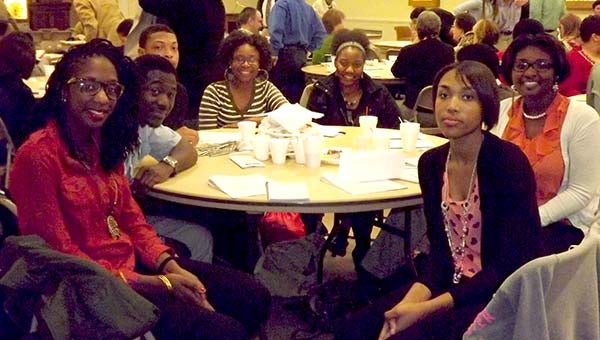Transportation big topic at post legislative gathering
Published 10:44 am Saturday, March 16, 2013

Local students, including a group from Franklin High School, attended the Franklin-Southampton Area Chamber’s Post Legislative Eggs & Issues event Friday morning at the Franklin Baptist Church fellowship hall. Pictured are Dikeya Cox, from left, Travis Brown, JaVonte’ Blacknall, Elizabeth Whitehead, Wawijah Jones, William Jackson, Summer Dorsey and Kelly Felton. — Lucy Wallace/Tidewater News
FRANKLIN—The newly passed state transportation plan was the big item discussed Friday morning at the Post Legislative Eggs & Issues gathering.
Hosted by the Franklin-Southampton Area Chamber of Commerce and sponsored by Dominion Power, Del. Rick Morris (64th District) and Del. Roslyn Tyler (75th District) addressed issues from the recent Virginia General Assembly session to local civic and business leaders, as well as students from area schools.
Each delegate spoke about their participation in the legislative session and then answered questions from the floor.
Tyler said her issues of great concern were transportation, uranium mining, rights of non-violent offenders and education.
“We finally passed a comprehensive transportation bill,” she stressed. House Bill 2313 makes changes to revenues collected by eliminating the gas tax and instead includes a sales tax that will help distribution of revenue to various regions of Virginia to address transportation needs. Tyler said the money would address regional issues. “In rural Virginia we will not have a lot of construction, but we are concerned about maintenance,” she said.
She also said she was pleased to have worked with the governor to see that the tolls were prohibited on Interstate 95.
She also praised the state’s community college system, saying it was dear to her heart as all of her children went to community college. “The system has helped me afford the opportunity for education.”
She stressed that the career advancement courses offered were the “wave of the future.”
Morris spoke about his major issues, which included House Bill 1327 pertaining to Port of Virginia Economic and Infrastructure Development Zone Grant Fund. The bill adds the City of Franklin to localities in which businesses related to commerce though the Port of Virginia may locate or expand and be eligible to apply for grants based on jobs created.
Other issues Morris discussed included teacher performance grant initiatives. House Bill 2083, which he co-sponsored establishes the Strategic Compensation Grant Initiative and Fund, which gives local schools the opportunity to submit proposals to the state Board of Education to receive incentive grants to be used to improve teacher and school performance.
In a related bill Morris also co-sponsored, public schoolteachers, assistant principals and principals will be evaluated annually to include student academic progress.
Turning to the transportation bill, Morris stressed, “Virginia needs to address our roads.” He said the money raised in newly instituted sales tax means different areas off the state will meet their own unique needs and guarantees the money will stay in the specific area.
He said the plan is a compromise, repealing the 17.5 cents per gallon gas tax and replacing it with a 3.5 percent tax on the wholesale level. Also the sales tax will increase from 5 to 5.3 percent with the .3 percent going to roads.
“In rural Virginia, the tax will help maintain roads,” he said.
Once the delegates wrapped up their legislative overview, questions from the floor were received, including ones from Franklin High School student JaVonte’ Blacknall and Southampton High School student Colby Rountree.
A question about Obamacare and its affect on the state prompted Tyler to explain that there was a lot of discussion about it, and the state wants to have control. She said the initial phase would have a committee working with providers and insurance companies for the state exchange process.
Morris further said that a commission was formed for Virginia to stop Medicaid fraud and abuse. He explained that the expansion of Medicaid would have cost the state $400 million of matching funds, not budgeted. “We must reform Medicaid, otherwise it will be a financial burden on Virginia.”
The final question was about the local affects of sequestration. Morris maintained that sequestration meant “mandatory cuts” but in reality it is “only cuts to a proposed increase of spending.”
Tyler said the issue came up during the budget session and that Virginia has a rainy day fund to protect the citizens of the Commonwealth. “Right now we have a safety net,” she said.





